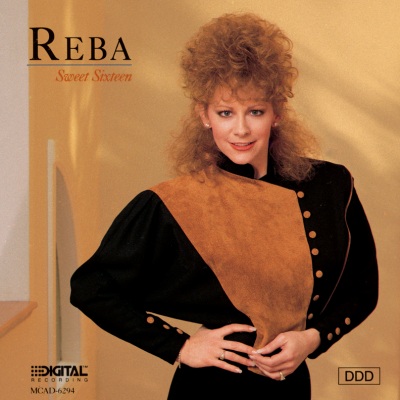
Sweet Sixteen
by William RuhlmannReba McEntire's 13th regular studio album Reba shocked some fans and critics by taking a distinct pop crossover direction after several years during which she maintained that she was a neo-traditionalist country artist. On Reba, the fiddles and steel guitars were banned from the studio as McEntire made like Aretha Franklin singing "Respect." The album topped the Billboard country charts for eight weeks, but McEntire seems to have felt that she should reassure her country base, and so Sweet Sixteen (which is her 16th album only if you count her Greatest Hits and Merry Christmas to You) welcomes the fiddles and steel guitars back as she returns to the neo-traditionalist fold. This is an album on which McEntire doubles back to a formula that worked for her in the past. Kendal Franceschi and Quentin Powers wrote her 1986 career song "Whoever's in New England," and they are back for two selections here, both of which have some of the melancholy of that ballad, but aren't as good. "It Always Rains on Saturday," for which McEntire claims a co-writing credit, takes too long to get to the point of its story, that the narrator is a divorced mother made lonely when her young son goes off to spend the weekends with his father. "Little Girl" (which became the LP's third country Top Ten hit) has the singer confessing to being overanxious and to having failed at love again. McEntire once coaxed a major hit, "Somebody Should Leave," from legendary country songwriter Harlan Howard. She hasn't obtained another one from him, but she has crossed pens with another heavyweight tunesmith, Don Schlitz, co-writing "Am I the Only One Who Cares," a too-cute story song about a fight between a mother and her teenager daughter that is mediated by a talking moon (!), and "You Must Really Love Me," a bluegrass workout in the style of Emmylou Harris. Another genre exercise is "'Til Love Comes Again" (the record's second country Top Ten), which leans heavily on fiddle and steel guitar and sounds like it was written for Patsy Cline, whom McEntire successfully impersonates. "Say the Word" investigates still another familiar country style, honky tonk. The album's pop elements are either muted or more closely tied to country than those on Reba. The track list begins with a cover of the Everly Brothers hit "Cathy's Clown" on which McEntire has altered the pronouns to add a third character to the story, another woman, the narrator, who observes the man she loves being Cathy's clown. It doesn't quite work, but that didn't keep the single from going to number one in the country charts when it was released in advance of the album. Another not-exactly-country-but-not-far-removed selection is "Somebody Up There Likes Me," an up-tempo CCM number that sounds like it might have been written with Amy Grant in mind. Perhaps the greatest indication that McEntire hasn't entirely given up on crossover is the recurrent sound of a saxophone in the album's arrangements. Its wail reminds the listener that, while the singer may be harking back to her country roots on Sweet Sixteen, her loyalty to tradition may be only temporary.
专辑歌曲列表
-
Reba McEntire 2953971 03:04
-
Reba McEntire 3599316 03:44
-
Reba McEntire 4377568 04:33
-
Reba McEntire 3006244 03:07
-
Reba McEntire 3063920 03:11
-
Reba McEntire 2968202 03:05
-
Reba McEntire 2785114 02:54
-
Reba McEntire 3306307 03:26
-
Reba McEntire 3142041 03:16
-
Reba McEntire 3379866 03:31

